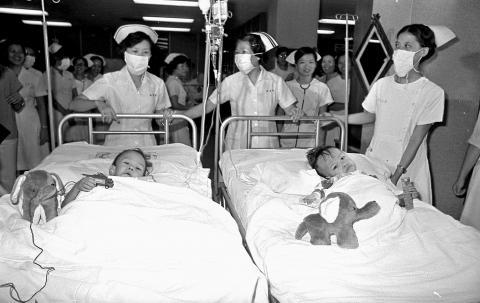One of the nation’s first conjoined twins to be successfully separated 40 years ago died of a brain hemorrhage yesterday, his family said.
Chang Chung-jen (張忠仁), 42, the older of the two, collapsed at work on Thursday and died early yesterday morning, his family said.
In 1979, Chang and his brother, Chang Chung-i (張忠義), were Taiwan’s first and the world’s fourth conjoined twins to be successfully separated.

Photo: CNA
According to Chang Chung-jen’s most recent post on Facebook, he had been planning to improve his public speaking skills so that he could share his story with more people this year, the 40th anniversary of their separation.
“I will go on living for my brother,” Chang Chung-i said yesterday, adding that they stood in for each other at work and took care of one another all the time.
Chen Wei-jao (陳維昭), who organized the twins’ surgery and was in charge of their postoperative care, said that Chang Chung-jen’s death was unexpected because no anomalies were found in his most recent medical examination.
The twins were expected to live only until their 20s based on the preoperative assessment, but they were able to lead normal lives, Chen said
The doctor said that Chang Chung-jen’s brain hemorrhage might have been caused by physical exhaustion, as he devoted himself to charity and had been traveling for years, sharing his stories and expressing his gratitude to the public, who donated more than NT$7 million (US$227,679 at the current exchange rate) to help raise the brothers.

The first global hotel Keys Selection by the Michelin Guide includes four hotels in Taiwan, Michelin announced yesterday. All four received the “Michelin One Key,” indicating guests are to experience a “very special stay” at any of the locations as the establishments are “a true gem with personality. Service always goes the extra mile, and the hotel provides much more than others in its price range.” Of the four hotels, three are located in Taipei and one in Taichung. In Taipei, the One Key accolades were awarded to the Capella Taipei, Kimpton Da An Taipei and Mandarin Oriental Taipei. Capella Taipei was described by

EVA Airways today confirmed the death of a flight attendant on Saturday upon their return to Taiwan and said an internal investigation has been launched, as criticism mounted over a social media post accusing the airline of failing to offer sufficient employee protections. According to the post, the flight attendant complained of feeling sick on board a flight, but was unable to take sick leave or access medical care. The crew member allegedly did not receive assistance from the chief purser, who failed to heed their requests for medical attention or call an ambulance once the flight landed, the post said. As sick

Minister of Economic Affairs Kung Ming-hsin (龔明鑫) yesterday said that private-sector refiners are willing to stop buying Russian naphtha should the EU ask them to, after a group of non-governmental organizations, including the Centre for Research on Energy and Clean Air (CREA), criticized the nation’s continued business with the country. While Taiwan joined the US and its Western allies in putting broad sanctions on Russia after it invaded Ukraine in 2022, it did not explicitly ban imports of naphtha, a major hard-currency earner for Russia. While state-owned firms stopped importing Russian oil in 2023, there is no restriction on private companies to

INDUSTRY: Beijing’s latest export measures go beyond targeting the US and would likely affect any country that uses Chinese rare earths or related tech, an academic said Taiwanese industries could face significant disruption from China’s newly tightened export controls on rare earth elements, as much of Taiwan’s supply indirectly depends on Chinese materials processed in Japan, a local expert said yesterday. Kristy Hsu (徐遵慈), director of the Taiwan ASEAN Studies Center at the Chung-Hua Institution for Economic Research, said that China’s latest export measures go far beyond targeting the US and would likely affect any country that uses Chinese rare earths or related technologies. With Japan and Southeast Asian countries among those expected to be hit, Taiwan could feel the impact through its reliance on Japanese-made semi-finished products and